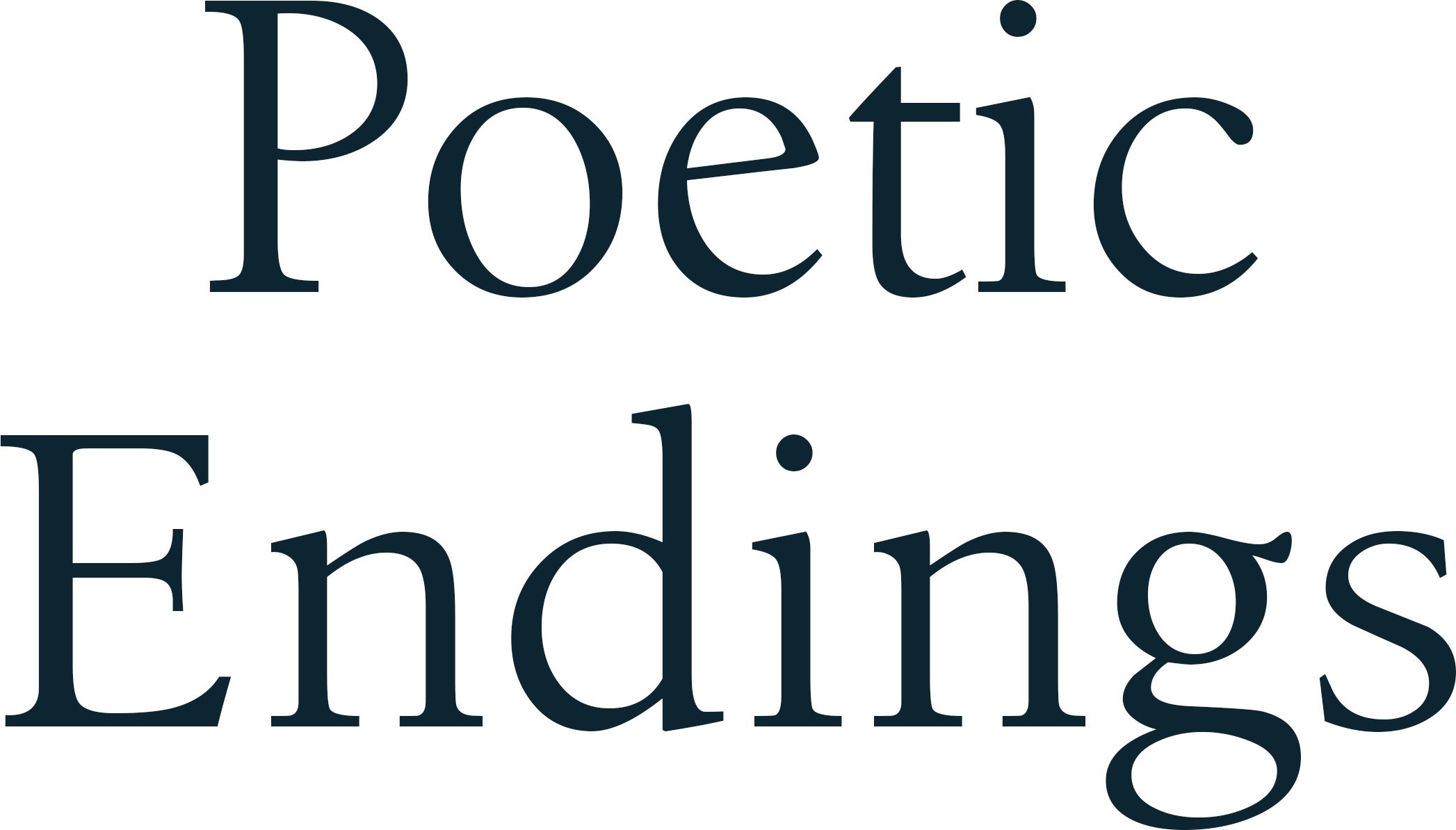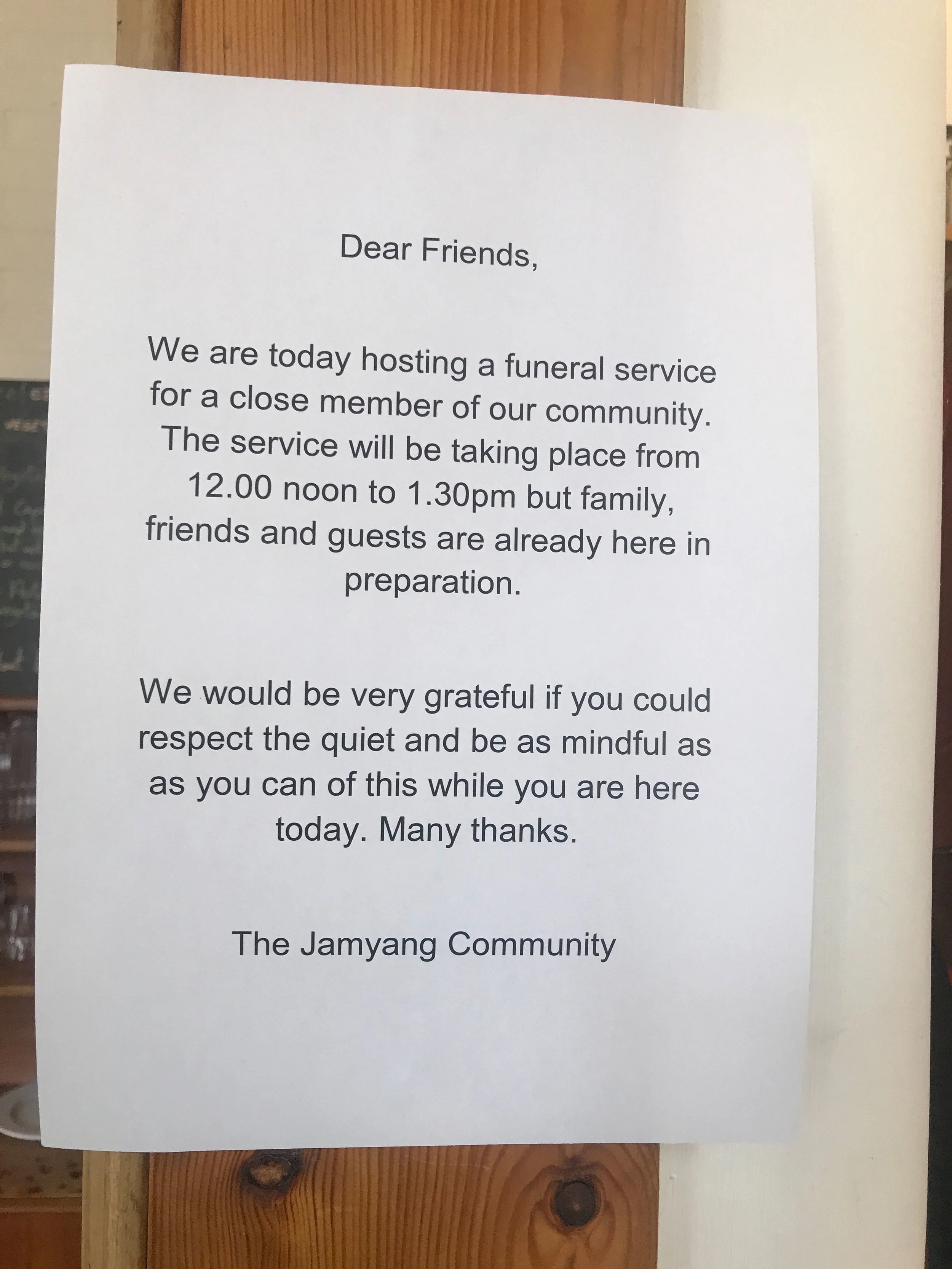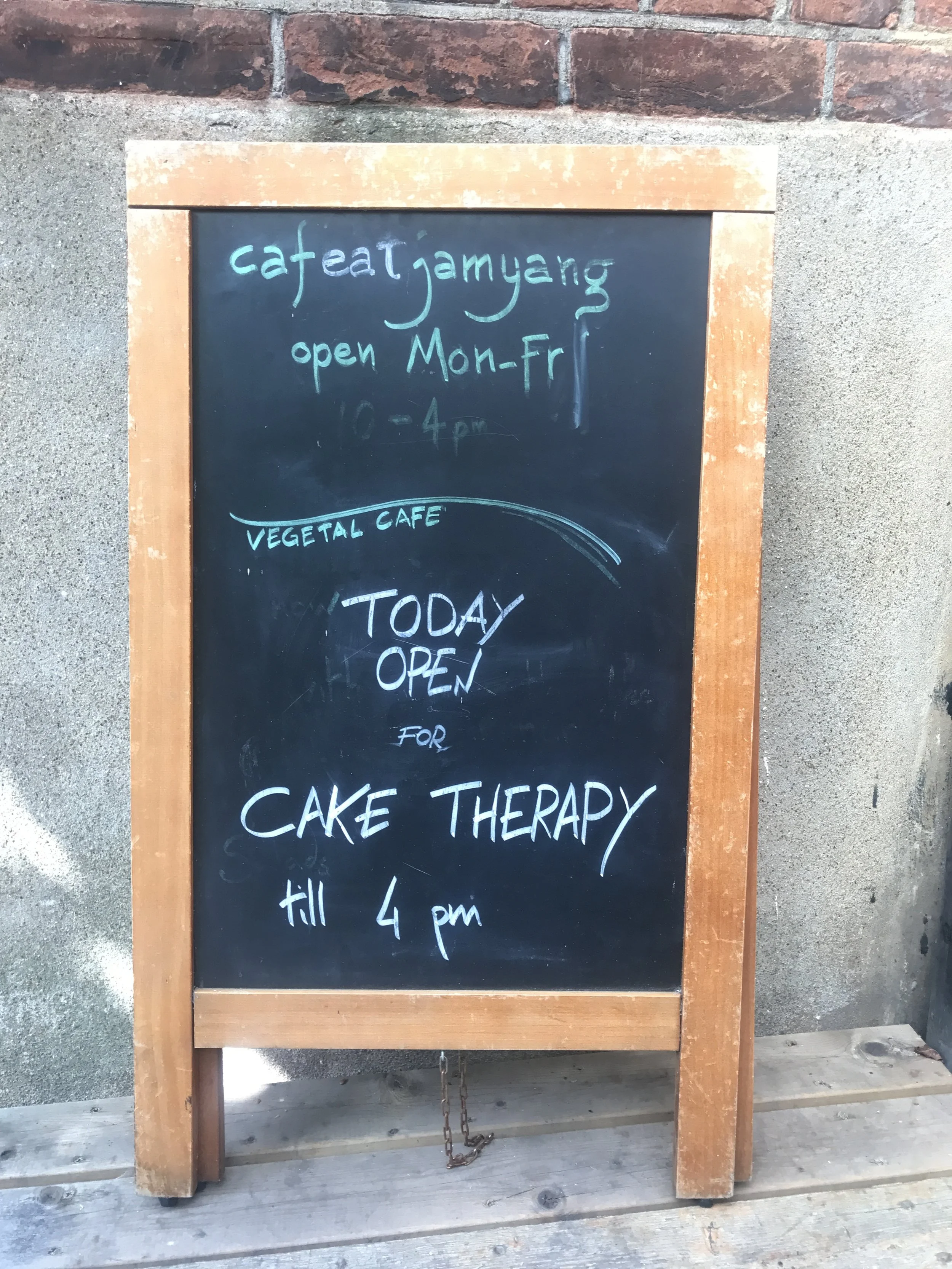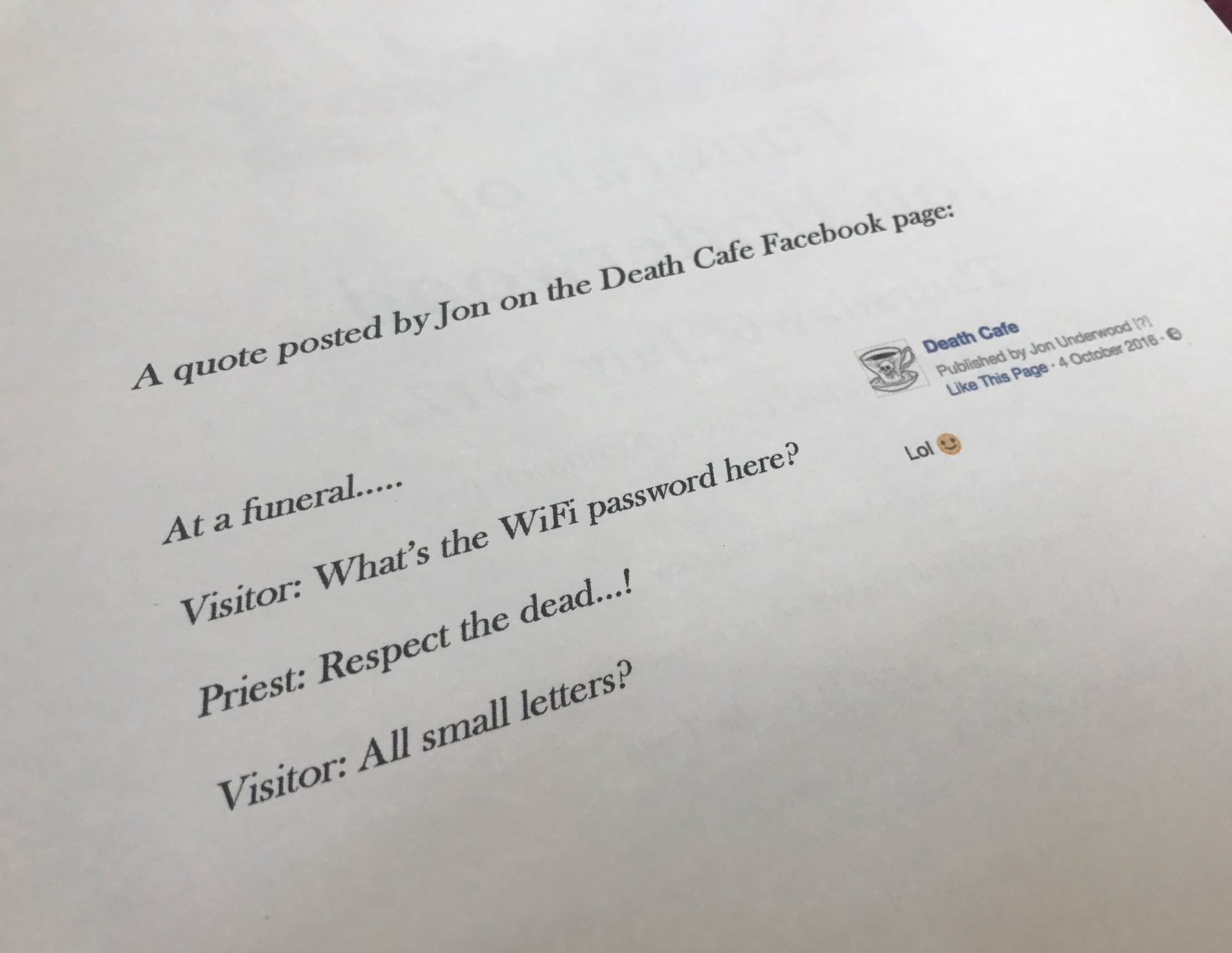Jon Underwood's Buddhist Funeral
Our friend and colleague, Jon Underwood, the founder of Death Cafe, died suddenly and unexpectedly from acute promyelocytic leukemia on 27th June 2017. He was 44. Through his innovative work, Jon encouraged hundreds of thousands of people around the world to discuss death and dying over tea and cake.
A perfect reflection of Jon, his Buddhist funeral was pioneering and groundbreaking.
Jon's funeral took place in the beautiful setting of the Jamyang Buddhist Centre in London on Thursday 6th July. Jon had managed the centre from 2000 to 2002 and had studied under Geshe Tashi, the centre's resident teacher. It had been Jon's dream to hold funerals at the centre and with an irony he would have relished, his was the first.
Jon arrived at the centre in an electric eco-hearse by Brahms - a Nissan Leaf which had been converted into a hearse and was on its first ever outing as a vehicle available for hire for funerals.
He was carried into the centre by his friends and colleagues from the funeral and Death Cafe community. Jon's rainbow willow coffin stayed in the main temple space whilst everyone drank tea and ate homemade cake from Jamyang's beautiful cafe in the sunlit gardens, preparing for the funeral ceremony to take place.
Jon's funeral took place in Jamyang's main temple space, a converted courthouse. The ceremony was led by Geshe Tashi, who paid tribute to his student and friend of many years. Jon's wife, mother, father, step-father, sister, brother and children all paid tribute to Jon with moving speeches.
After the funeral, everyone travelled to Jon's local pub, the Chesham Arms, on his street in Hackney to continue singing, playing music and sharing tributes. Jon had been part of a community initiative to save the pub from being taken over by property developers and he lived just a few doors away.
Jon was cremated the following day at City of London Crematorium.
Jon's funeral was beautiful, touching and personal. It reflected how important Jon had been to so many different communities. All of his family, including his two children, were involved in every part of the funeral from choosing his coffin to being part of the ceremony on the day.
Anna Lyons, Jon Underwood & Louise Winter at Jon's home in Hackney in October 2016
Louise Winter's Tribute to Jon Underwood
Louise spoke on behalf of both the funeral and Death Cafe communities at his funeral. You'll find the words she shared in tribute to her friend and colleague below.
"I met Jon several years ago when I began hosting Death Cafes and became involved in his project to launch a permanent Death Cafe in London. Some of the words you’re about to hear are mine, some are Jon’s, some are from my colleague Anna and some are taken directly from the tributes that have poured in from the death and dying profession over the last week.
So what is a Death Cafe?
Quite simply, it’s a gathering of strangers who come together to talk about all matters of death and dying over tea and cake. There’s no agenda and there are no set questions. The conversation is free-flowing. Absolutely anyone can host a Death Cafe, anywhere in the world.
What on earth do people talk about?
The list is endless. Funerals, the afterlife, near death experiences, wills, family, religion, grief, but more importantly, there’s also a lot of talk about life, living and the choices we make. Talking about death is the exact opposite of talking about the weather; it’s the perfect icebreaker between strangers.
I’ve hosted many Death Cafes now – at a festival headlined by Missy Elliot, on a farm in Essex, in an East London graveyard, in an abandoned church in Peckham, in my friend’s front room, at Shoreditch House and at the Southbank Centre, amongst many others.
At every Death Cafe I’ve ever hosted, I’ve always talked about Jon and how he realised that society could be so very different if only we could face up to the fact that one day we will all die. Jon explains it better than I ever could, so I’ll use his words:
Jon Underwood, who died on 27th June 2017 at the age of 44
“I'm motivated to do this work because I believe that engaging with death is both important and overlooked. My experience tells me that death can play a role in helping us enjoy life. I also believe that focusing on death can play a part in helping us get to grips with some big challenges - like supporting older people, climate change, a broken economic system and chronic global inequality. This may not immediately make sense but if we can face up to death we can face up to anything, no? I am very proud of my work - I don't think there has ever been anything quite like it!”
And then, after I’ve explained Jon’s reasoning, I talk about the importance of cake. You can’t have a Death Cafe without cake – it’s the law. And it has to be really good cake. Mr Kipling won’t do.
Cake is such an important part of Death Cafe because when discussing something as abstract and potentially scary as death, something as grounded and delicious as cake is essential.
Jon hosted the first Death Cafe on this street in Hackney in September 2011. Some of the people here today may very well have been at that first gathering.
Jon was always the first to point out the originator of the idea was Bernard Crettaz, a Swiss sociologist, but it was Jon's low key evangelism that gave the idea momentum here in the UK, thanks to his confidence in the social benefits, and his generosity in sharing it.
So who wants to sit around and talk about death? It turns out, quite a lot of people. Since the first Death Cafe, there have been almost 5000 Death Cafes in over 50 countries in diverse locations including festivals, local cafes, front rooms, farms, funeral homes, schools and universities, hospitals and hospices. Death Cafe has received unprecedented press coverage including the front page of the New York Times, Woman’s Hour, BBC Breakfast News and pretty much every other major news outlet around the world.
On Tuesday 27th June 2017, Jon did not pass away; he died - that difference in wording is an important distinction that Jon would have wanted us all to make; his work with Death Café helped to reclaim the words ‘death’ and ‘dying’ and placed importance on us all being unafraid of using the actual words and not speaking in euphemisms.
Jon passionately believed that in order to fully embrace life and living, one must also embrace death and dying. He brought tens of thousands of people together who, over tea and cake, began to talk openly and honestly about one of life’s toughest subjects.
He, quite literally, changed the face of death worldwide.
5000 Death Cafes. That’s a lot of people having a lot of awkward conversations!
Death has been owned for far too long by Doom, Gloom & Sons – the traditional funeral directors on the British High Street. Their version of death is hidden behind a dusty window display with a photo of austere Victorian gentlemen, a vase of plastic flowers and a memorial headstone. If this is death, no wonder the public is so reluctant to engage with it, until someone dies and they absolutely have to do so.
“No one wants to talk about death sweetheart,” a funeral director once told me, as he put his hand on my shoulder and shook his head.
The next day, nearly 100 people came to a Death Cafe I was hosting in Shoreditch. Every nook and cranny of the cafe was filled with people who were dying to talk about death.
“Perhaps you’d prefer to enjoy a pint at the pub?” I asked the queue of people waiting outside. “No way, we’re here to talk about death,” they protested. So we filled up every inch of floor space, letting people sit on the wooden floor and squash into a broom cupboard to get their fill of tea, cake and death.
Death is often quoted as being the last taboo and Jon took it back from the brink of hushed conversations behind closed doors and gave it the platform it deserved. My colleagues in the death and dying profession have been devastated by Jon’s untimely death. We are honoured that we were able to call him both a colleague and a friend.
Jon was undoubtedly one of the good guys. He was kind, gentle and genuine while being hugely knowledgeable and an endless source of encouragement and support.
With Anna, who is here today, I ran a festival about death and dying, inspired by our work with Jon and Death Cafe, which ran just around the corner from here at the National Trust’s Sutton House.
When we were at Sutton House to begin the installation of Life. Death. Whatever, Jon arrived, a tray laden with tea and biscuits in hand, and just got on with helping us. During the month we were there, Jon was always on hand to help in anyway and when it was time to dismantle the show, he wrapped, packed, boxed and carried and wouldn’t leave until it was all done.
Along with hosting a Death Cafe, he gave a talk on Death Activism and afterwards we tried to find him to thank him and to chat about the excellent feedback we’d been receiving from the audience but he’d disappeared.
After quite some time he returned and it transpired he had been escorting people through the graveyard and making sure they reached Hackney Central Station safely.
Jon celebrated his final birthday – his 44th – with us at Life. Death. Whatever. on October 28th 2016. We sang happy birthday to him, gave him cake and gifted him with one of the infamous Life. Death. Whatever. tea towels.
Jon was a true gentleman and incredibly humble. He sometimes seemed slightly reluctant to be in the spotlight but that only cemented our understanding of his true humility: he didn’t set up Death Cafe for himself, he did it for society and for the greater good.
He was a mix of quiet determination, loving kindness, extreme modesty and belief in the importance of the work he was doing. His commitment to making the world a better place through Death Cafe was unwavering.
Thank you, Jon, for single-handedly redesigning the dialogue surrounding death and dying. And thank you for being a warm and generous friend and colleague. Your loss and your legacy are immeasurable.
So long Jon, and thanks for all the cake."










